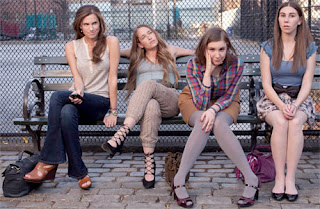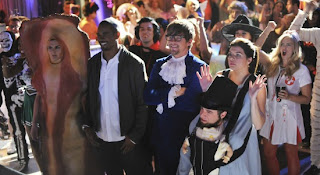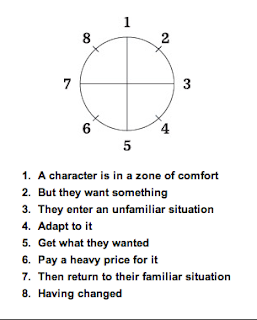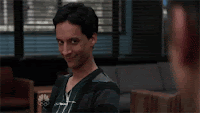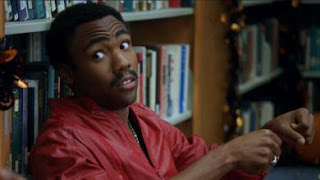“Community” has had such a troubled run. At the same time, it is also more privileged than most shows. Besides multiple hiatuses and threats of cancellation, the show has seen one showrunner get fired and then re-hired. But the loud voices of the Internet spoke, and Dan Harmon’s vision got to beat on.
Category Archives: Community
Top 10: TV Shows of 2012
10. 30 Rock
“30 Rock” hit a bit of a rough patch at the beginning of 2012. However, it bounced back for its seventh and final season and has turned out some of its best episodes in years. Most notably, this season saw Liz Lemon (Tina Fey) finally tying the knot in a wedding that was both moving and wacky in a way that only “30 Rock” could deliver. “30 Rock” is one of the best heirs to the sitcoms of the 70s with its fearlessness in tackling race, political, and gender issues for huge laughs. In fact, it ended the ridiculous “are women funny?” debate with a monkey wearing a suit. No other show on TV can deliver so many jokes in such a short span of time. “30 Rock” might be winding down, but the many doors it opened for the flood of single-camera comedies that have emerged over the years will always be present.

9. Archer
“Archer” is far and away the best animated show on TV. A spy spoof that puts “Austin Powers” to shame, “Archer” proved that its spectacular first two seasons were just a warmup for how perfect season three would be. Few comedies currently on TV have plots as smart and intricate as “Archer” does, whether the bumbling heroes are trying to get rid of a dead body or fight villains in outer space. What makes “Archer” so unique is the neat little backstories it gives to all of its characters, which expanded in ever satisfying ways this season. For example, Archer’s constant literary references suggest someone much smarter than he acts. “Archer,” however, never has to hide its sophistication. It continues to be one of the sharpest satires currently on TV.
8. Homeland
I was a late convert to “Homeland,” and I am not ashamed to say that I caught up in less than one week. “Homeland” hit a bit of a rough patch this season. However, those who immediately jumped ship need to learn a thing or two about TV history, and that “Homeland” is in the same company as some pretty great shows that have had faulty seasons and then bounced back. Even in the implausibility, there has still been plenty to love about season two. The show made a pretty risky story move early on and then built it up to an interrogation scene that was one of the most finely acted and scripted in TV history. However, this season went through a few big bumps in the road. One was literal (a car accident that was worth it only for allowing actress Morgan Saylor to shine) while others were illogical (see: Skyping with a terrorist on a Blackberry). Yet, I was still compelled to watch “Homeland” from week to week, and discuss with every other fan I knew. Many other shows have gone through rough patches early on, and I have faith in where next season will take us.

7. Happy Endings
The funniest show currently airing on network TV (while another one is still in an overlong hiatus) is also the most underrated. “Happy Endings” took the concept of “twenty/thirty-something friends” in a big city to insane new heights throughout seasons two and three. It does self-referential better than most shows on TV, and it knows when to be over-the-top and when to be human. “Happy Endings” doesn’t just succeed in its endless mocking of sitcom tropes, but also how natural the ensemble feels together. Often, it just feels like a tight-knit improv group going crazy in whatever direction they desire. Plus, it has my favorite married couple on TV (Brad and Jane) and the most hilariously non-stereotypical gay character since “The Sarah Silverman Program.” In the vein of “30 Rock,” “Happy Endings” could probably cram more funny into five minutes than most shows ever could in an entire season.
6. Game of Thrones
2012 was the year I got back into fantasy. “Game of Thrones” was one of the many shows this year that helped push the medium forward, as it pushed its own storytelling ambitions in new directions and away from its source material. It truly blurred the difference between film and television with the episode “Blackwater,” which contained a battle as epic as anything in “The Lord of the Rings” trilogy. What I always liked best about “Game of Thrones” is that even when it travels into the territory of dragons and the undead, it still remains incredibly grounded, as this story is much more of a political allegory than a battle of good versus evil. If “Game of Thrones” has proved anything to me, it’s that moral ambiguity is way more interesting than battles of absolute good against absolute evil. Without it, where the hell else would we get amazing characters like Tyrion (Peter Dinklage) and Cersei (Lena Headey) Lannister, Theon Greyjoy (Alfie Allen), and Joffrey Baratheon (Jack Gleeson)? Well, I think I know how everyone feels about Joffrey.

View the top 5 after the jump
5. Girls
Amidst all of the controversy and unrighteous indignation, “Girls” had the most solid first season of any new show that debuted this year. Virtually overnight, Lena Dunham deservingly became a household name. “Girls” is a mixture of both the trademark edginess of HBO, and the trademark awkwardness of the Apatow brand. This show about Brooklynites in their early twenties treads a lot of new ground and says a lot more about this generation than most other works in any form of entertainment have. Yet, Dunham is too modest to try and become the voice of a generation (a fact that is mocked in the very first episode). “Girls” caught my attention in every episode for its cinematic audacity (scenes of pure dialogue that nearly hit the ten minute mark) and chaotic humor that might take multiple viewings to fully appreciate (“I’ll be your crack spirit guide”). Each episode opens with completely different theme music. In one year, Dunham created an indelible new world and filled it with lively and memorable characters. Many people criticized the show for its lack of diversity. I found this claim to be ridiculous, as it does not acknowledge the world these characters inhabit and it does not at all do justice to the substance of the show. With all of that out of the way, I think it’s easier to appreciate the nearly flawless first season of “Girls.”
4. Breaking Bad
What more can I (or everyone else) say about “Breaking Bad” that I haven’t said already? Probably not much, but I don’t mind reiterating. As it prepares its swan song, “Breaking Bad” has proved itself more brilliant than ever. I’m still waiting for Vince Gilligan to top the season four finale, but for now I can live with a train robbery and a meth-induced montage. “Breaking Bad” has always been excellent at keeping us at the edge of tragedy, and never letting us know when we are going to go off the cliff, and this past season was no exception. The first half of season five found Walter White on top of the world, with no worlds left to conquer. He had gone so far off the edge that at times, it was hard to tell whether or not he wanted to back away. All I know is that any barriers of safety for the audience that once existed have all evaporated. I have no idea where “Breaking Bad” is headed for its last few episodes. All I know is that it still has a lot of ground to cover, and it shows no signs of letting any of us down.
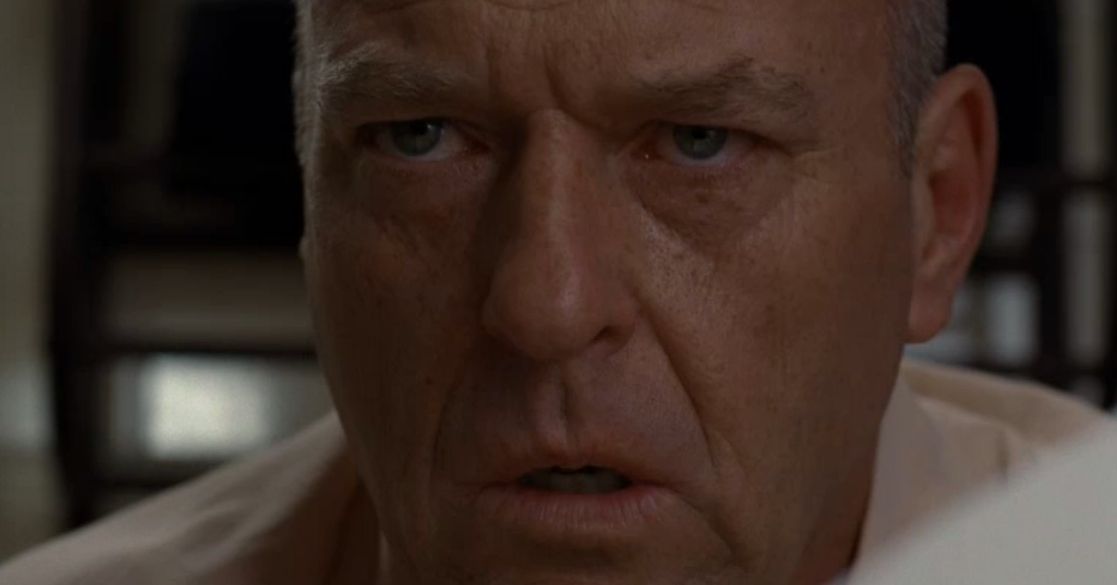
3. Mad Men
“Mad Men” now carries the honor of being one of few shows to peak during its fifth season. When most are winding down, “Mad Men” rediscovered its mojo in new, exciting, and profound ways. It all added up to the best drama of the year. The writers of “Mad Men” are like few others, and they went into the surreal this season, catching Don in the middle of an elaborate dream while Roger experienced an LSD-fueled reality. Supporting actors such as Christina Hendricks and Vincent Kartheiser gave beautifully nuanced performances. Meanwhile, Michael Ginsberg (Ben Feldman) was a welcome new addition to Sterling Cooper Draper Pryce. The ad executives faced unimaginable tragedy even in a season filled with dark humor (one of the best, yet saddest, gags involves a Jaguar that won’t start). Like the world around them, the characters of “Mad Men” have been allowed to change and evolve. Into its fifth season, “Mad Men” still continues down the dark abyss of American Dream, still exploring whether or not America really offers second chances.
2. Community
2012 has been a rough year for “Community.” It got put on hiatus multiple times, it was nearly cancelled, it lost one of its stars (Chevy Chase), and the mastermind behind it all (Dan Harmon) was fired in what can only be seen as a network and a studio out of touch with the times. Even with all of the trouble in the real world, “Community” is like the Dreamtorium: a place to escape from reality and into the mind of one very strange individual. In its season three, “Community” was darker and more inventive than ever. It put the Greendale Seven into a videogame, a heist movie, and an Ed Burns documentary. In each of those, it was a stunningly faithful homage that brought depth to its richly created characters. “Community” is special in that the weirder it gets, the less it forgets about its characters. “Community” might not be made for everyone, but if you are not ever won over by Dean Pelton’s man-crush on Jeff, Troy’s innocence, or Britta’s ability to ruin everything, then you have no heart. “Community” wants fans, but season three seemed to display a show that cared less about getting high Nielsen Ratings (which, with the Internet, will soon be irrelevant) and more about telling good stories. “Community” includes some of the most innovative storytelling that we’ll never see again on network television.
1. Louie
After much thought, I could put no other show in first place. “Louie” is not necessarily an “event” type show, but I found myself eager every Thursday night this summer to watch it live. I knew that every week would provide me with a totally unexpected episode. “Louie” is the most unpredictable show on TV, and with every episode, Louis C.K. manages to break down all sitcom conventions without being snarky or obnoxiously ironic. This season, he proved himself as a master of dramedic storytelling. He nailed the sentimentality of so many moments and steered them away from sappiness. Whether surreal or realistic, each episode felt like a short movie that could only be made with the raw inspiration of New York City. Yet, C.K. took his fictional character to new places this year. In a three part arc that included the best celebrity cameo I’ve ever seen on TV, Louie tried to host the Late Show. Another episode had him at a strip club with Robin Williams. And then another had him involved in a boat chase. The season finale, which brought him on a journey of self-discovery in China, reduced me to tears. Some might call “Louie” gloomy, but its message is so positive: life will never be easy or predictable, so we might as well roll with whatever is thrown at us. The feeling that people in the 70s first got when watching “All in the Family” and “Taxi” and the feeling that people got when first watching “Seinfeld” in the 90s, I got while watching “Louie.”
Honorary Mentions: Parks and Recreation, New Girl, Portlandia, Veep
Analog This: My 2012 Emmy Winners
I think everything that can be said about the many problems with last night’s Emmys has already been said. Instead of ranting about Jon Cryer and “Modern Family” ruining everything, I will just say that I am happy that Louis C.K. got rewarded both for changing standup comedy and pulling off perhaps the greatest fart joke ever and making it last for an entire episode.
Here are my winners for the best the year had to offer in television. Keep in mind that many of these people and shows weren’t even nominated for Emmys this year (after the jump):
Outstanding Comedy Series: “Girls”
Outstanding Drama Series: “Breaking Bad”
Outstanding Writing (Comedy): Chris McKenna, “Community” (Episode: “Remedial Chaos Theory”)
Outstanding Writing (Drama): Erin Levy, Matthew Weiner, “Mad Men” (Episode: “Far Away Places”)
Outstanding Actor (Comedy): Louis CK, “Louie”
Outstanding Actress (Comedy): Gillian Jacobs, “Community”
Outstanding Supporting Actor (Comedy): Nick Offerman, “Parks & Recreation”
Outstanding Supporting Actress (Comedy): Eliza Coupe, “Happy Endings”
Outstanding Actor (Drama): Bryan Cranston, “Breaking Bad”
Outstanding Actress (Drama): Lena Headey, “Game of Thrones”
Outstanding Supporting Actor (Drama): TIE: Giancarlo Esposito, “Breaking Bad”; John Slattery, “Mad Men”
Outstanding Supporting Actress (Drama): Christina Hendricks, “Mad Men”
Outstanding Directing (Comedy): Jay Chandrasekhar, “Community” (Episode: “The First Chang Dynasty”)
Outstanding Directing (Drama): TIE: Vince Gilligan, “Breaking Bad” (Episode: “Face Off”); Neil Marshall, “Game of Thrones” (Episode: “Blackwater”)
Outstanding Variety Series: “The Colbert Report”
And if I were to make this list a little bit longer: Jim Rash (“Community”), Donald Glover (“Community”), Danny Pudi (“Community), the rest of the cast of “Happy Endings,” Amy Poehler (“Parks & Rec”), Chris Pratt (“Parks & Rec”), Bob Odenkirk (“Breaking Bad”), “Archer,” “Bored to Death,” Allison Williams (“Girls”), “Curb Your Enthusiasm” (everything about the episode “Palestinian Chicken”), “Portlandia”
 |
| From “Game of Thrones” episode “Blackwater” |
Analog This: The Emmy Snubs of 2012
Emmy nominations came out this morning, and I’m celebrating them the same way I celebrate every awards ceremony: honoring those who didn’t get nominated! Yes, I understand at this point that these awards ceremonies are all politics, but it’s still fun to complain.
I am going to do my best to be nice and not call out any specific, undeserving nominations right here. Instead, you can all get right to reading my list of the most egregious snubs after the jump:
Happy Endings
Perhaps the snappy, pop culture reference-laced dialogue was too much for voters to handle. However, in its sophomore season, “Happy Endings” defied all expectations and became one of the funniest shows on television. While so many shows have tried so hard to rip off “Friends,” “Happy Endings” instead became a part of the post-sitcom wave. It is also the rare showin which there is an argument for any character being the funniest character on the show. Maybe next year will finally be The Year of Penny.
Parks & Recreation
A nod for Best Comedy seemed inevitable, and this snub is probably the most surprising one of all. While I still think that season three was best, wide consensus hailed season four of “Parks & Rec” the best in the series so far. And yes, it did hit so many high notes, both comically and emotionally. Season four took some big gambles, including leaving the parks department for some real world parody of the campaign trail. It is pretty incredible to see how far this show has come since its first season. What was once a spinoff of “The Office” has now taken on a life of its own, with the fictional town of Pawnee being just as funny a character as Ron Swanson and Tom Haverford have ever been.
Jack Gleeson (Game of Thrones)
I think it can be agreed upon by all “Game of Thrones” fans that Joffrey Baratheon is the most hated character on this show, and perhaps on all of television and film. However, an actor must be this good to make a villain so clearly evil, yet so compelling to watch. Joffrey’s most memorable scene this season involved two prostitutes. It is as painful to watch as it is hard to erase from memory. Gleeson plays it completely straight, never offering an ounce of sympathy to him. Seeing him get slapped in the face felt all the more satisfying.
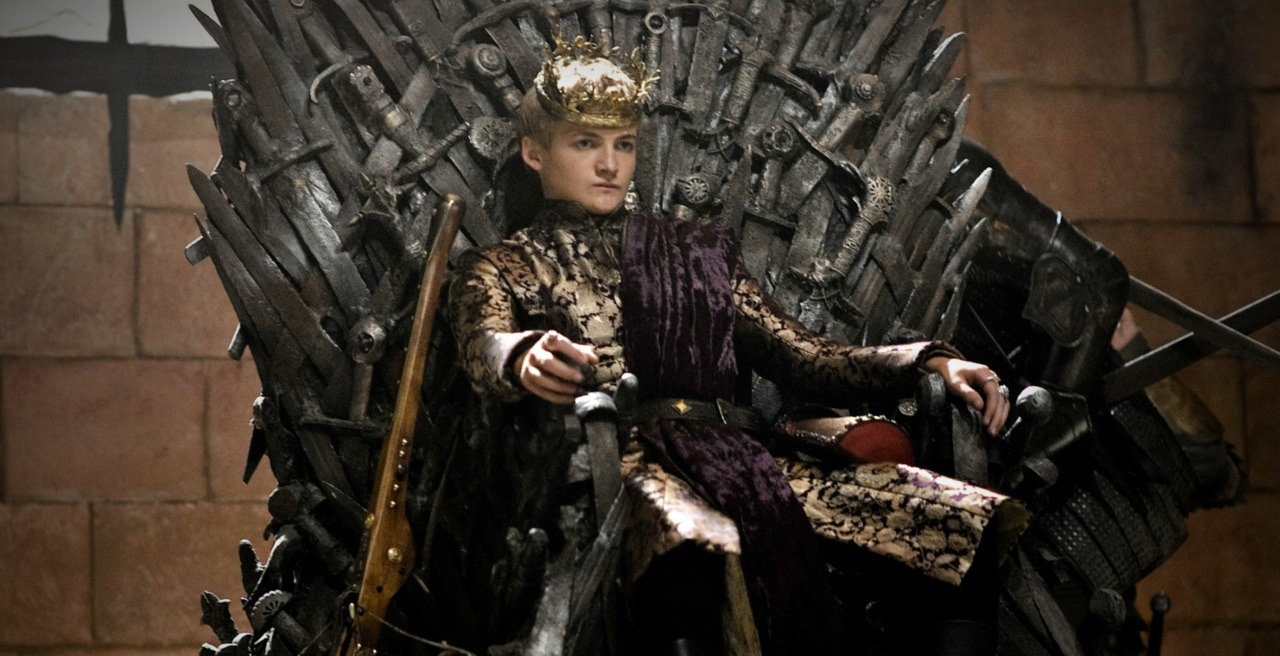 |
| No video of Joffrey could possibly be safe for work. |
Jim Rash (Community)
Sometimes, when a comedy gives a standout side character more screen time, viewers come to realize that they were better in small doses. However, this is not the case for Jim Rash, who was worthy of carrying multiple episodes as the hilariously flamboyant Dean of Greendale Community College. In “Documentary Filmmaking: Redux,” he flawlessly channeled both Coppola and Brando. A psychotic director has never been this funny. He can also deliver every sexual innuendo he is given with more subtlety and cluelessness than irony. Sexual confusion hasn’t been this funny since Tobias Funke, but with his undying love for his dysfunctional community college, Rash secretly gives the show its heart.
Gillian Jacobs (Community)
Yes, this list gets two members of the “Community” ensemble. Since the Emmys decided to devote almost an entire category to “Modern Family” actors, I’ll call it even. The “Community” writers have altered Jacobs’s Britta Perry more than any other character on the show since season one, and Jacobs has perfectly kept up with the change. In fact, in one episode this season, Jeff (Joel McHale) says, “you seemed a lot smarter when I first met you.” Britta is the well-intentioned political activist of the show who is constantly wrong about everything. Jacobs is a great comedic actress because she seems willing to do just about anything, and she delivers every line she gets as if she is not thinking before she speaks. But for a truly great example of why she should have been nominated, look no further than “Pillows and Blankets,” one of the show’s top five episodes. In an episode that was supposed to be about Troy and Abed, she stole it with less than five minutes of screen time and not a single line of dialogue.
Other Snubs: Nick Offerman (“Parks & Rec”), Adam Scott (“Parks & Rec”), John Slattery (“Mad Men”), Matt Walsh (“Veep”), Anna Chlumsky (“Veep”), “Louie,” “Archer,” every member of the “Happy Endings” ensemble, Cougarton Abbey
Note: There is no point in mentioning the “Community” snub in the Best Comedy category. I would pretty much be re-iterating what I said last year.
Let me end this on a somewhat more optimistic note: “Veep” and “Girls” are both getting the love that they deserve. Louis C.K. got nominated for Best Actor. “Curb Your Enthusiasm” got nominated for what was possibly its best season yet. “Breaking Bad” cleaned up. “Community” scored its first nomination ever, and of course it was for Best Writing for the episode “Remedial Chaos Theory.”
Analog This: Community, Pillow Fights, and Storytelling Algorithems
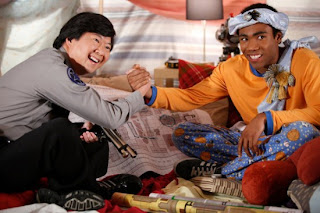 |
| The Changlourious Basterds. |
Earlier this week, while reading a document for my English class, I realized something: studying theory can really suck, especially when words such as “interpellation” are used every other word. So I vow now, when discussing a comedic pop culture artifact* such as “Community,” I will do all I can to stay away from such language.

Analog This: Community, and How Social Media Saved it
Warning! Some minor spoilers for tonight’s episode. And if you are a community college student then no, you cannot be a pirate as well.
I am not one of the righteous few who has deactivated their Facebook account and returned to reality. Having said that, here are a few reasons why I hate social media: it is addicting, it is causing people to be too concerned about the affairs of others, and it all together makes us more vain and self-concerned.
And here is why I love social media: without it, “Community” might not have been back on the air tonight. I am not in any way taking credit away from the show’s brilliant mastermind Dan Harmon, nor the NBC executives, who are not getting enough credit for continuing to keep this strange little show on the air, despite its low ratings.
However, “Community” was pervasive on Twitter this week. One of the top trending topics the other day was #anniesboobs. The fact that this joke, which only an avid “Community” fan would understand, was that popular, shows its fan base goes beyond what Nielsen can calculate. If they came out today, perhaps the likes of “Freaks and Geeks,” “Undeclared,” and “Firefly” would never have been cancelled.
I have been talking about “Community” a lot the past week, enough so that many people might just want me to stop, as this is supposed to be a site about the movies. To that I counter and say that “Community” is inspired as much by film as it is by television. It puts every pop culture reference that runs through my brain on a daily basis on screen. At times, I have been tempted to compare “Community” to “Arrested Development,” but “Community” truly defies comparison. Every week, it tries to do something that no show on television has done before. It can be hit or miss, but either way, it is the most joyfully ambitious show you will see on television today.
But between intense blanket forts and paintball fights, “Community” is all about its characters. Fittingly, tonight’s episode, entitled “Urban Matrimony and the Sandwich Arts,” was about a grounded return to normalcy. Jeff started the episode complaining, and ended it with a speech. Britta tried to be fiercely independent, Annie was hopelessly romantic, and Pierce was trying to sell something racist. A day in the life at Greendale Community College.
But as always, things were far from normal. Shirley was getting re-married to her husband Andre, and Britta found herself to be a fantastic wedding decorator, despite her hatred of marriage. Meanwhile, Troy and Abed decided to act “normal” for once, only to discover that their weirdness is the only type of normal they could ever be.

In most sitcoms, each character seems to have some assigned role they must fulfill in each episode. “Community” follows that, yet acknowledges it, at the same time. This was proven in “Remedial Chaos Theory” (if you haven’t seen this episode, which has seven separate story lines, watch it immediately). But in tonight’s episode, and I believe it will be a theme for the rest of the season, everyone realized they are not who they thought they were. Pierce is not a businessman, Shirley is not just a mother, and Britta will soon have to say goodbye to her days as “Anarchist Cat Owner.” As Harmon said himself in an article in the New York Times, “Community” is headed into some very dark territory.
Yet, there was still something very right about tonight’s episode. The first half of the season was a mixed bag, with the highlights being the aforementioned “Remedial Chaos Theory” and “Documentary Filmmaking: Redux.” Those are two of the best episodes of “Community” so far. However, the rest of the first half of the season was missing the zany inventiveness and brains of the previous season. It all came back tonight and hopefully, will be here to stay for a while.
I still have no idea how this show will end, but tonight, I got a better idea of where it is headed. I imagine the final shot looking something like that of the series finale of “The Sopranos,” minus “Don’t Stop Believin’.” Hopefully, that finale won’t come for quite a while. I have bright hopes that the six seasons and a movie that Abed once championed will become reality.
This Week, We are a Community: Day 4
This is the most accurate way to describe how the collective “Community” fan base feels about the return of the show tonight:
This Week, We are a Community: Day 3
New life goal: Become Don Draper and Abed combined.
This Week, We are a Community: Day 2
In “Crazy, Stupid, Love,” Steve Carell describes his wife as “the perfect combination of sexy and cute.” This clip is the perfect combination of sexy and creepy.
I guess that’s the whole point of the song. But I hope this is the last time I will ever have to use Alison Brie and creepy in the same sentence.
This Week, We are a Community: Day 1
This Thursday, “Community” comes back from nearly-cancelled purgatory to finish off its third season. To celebrate the return of my favorite show, and to thank NBC for avoiding its third biggest mistake ever (following the cancellation of “Freaks and Geeks” and the Conan fiasco), I’ve decided to post a clip from “Community” every day until its return. Hopefully, the clip is hilarious and context free. I apologize if every clip I choose somehow involves Donald Glover yelling like a child. Enjoy.


